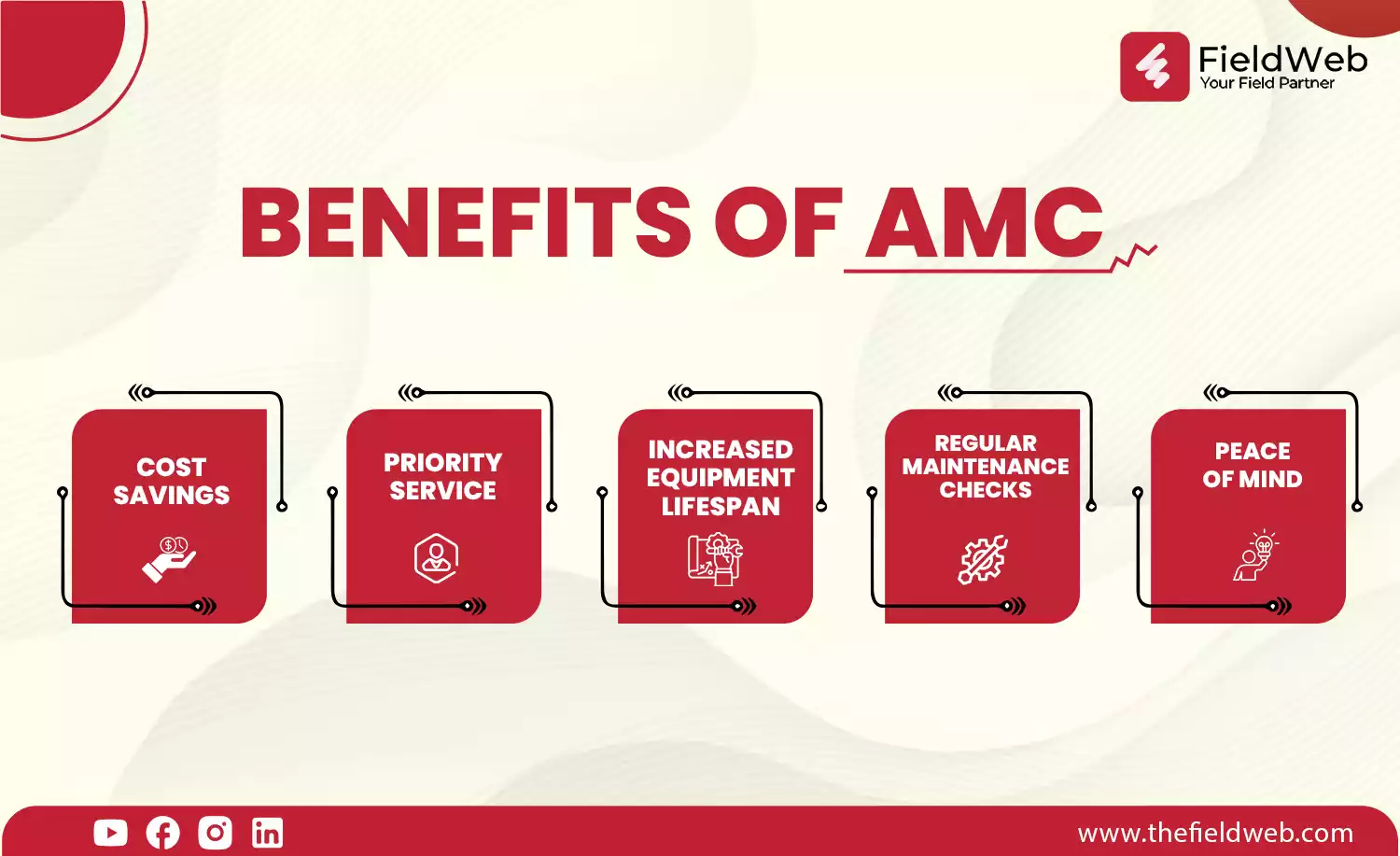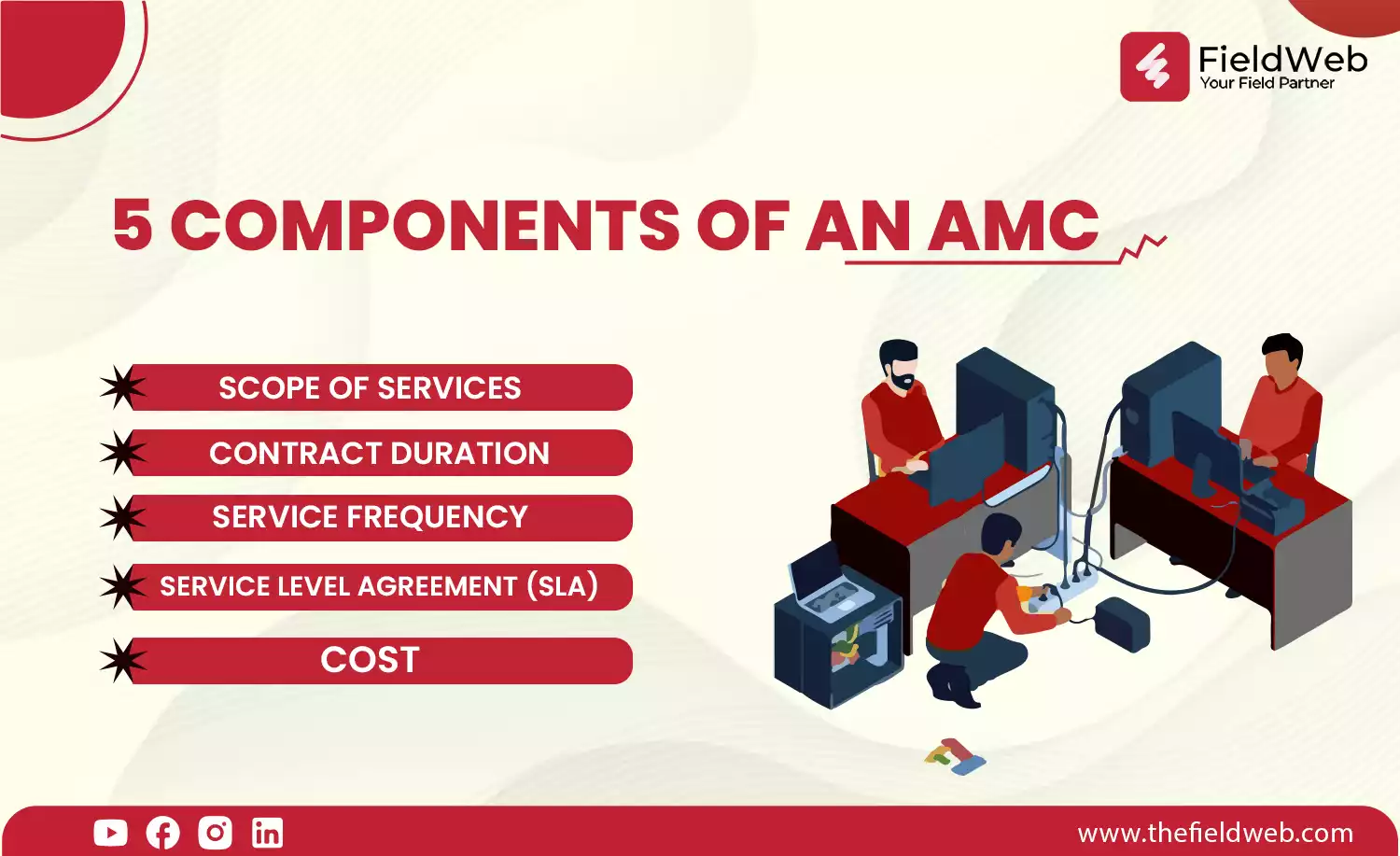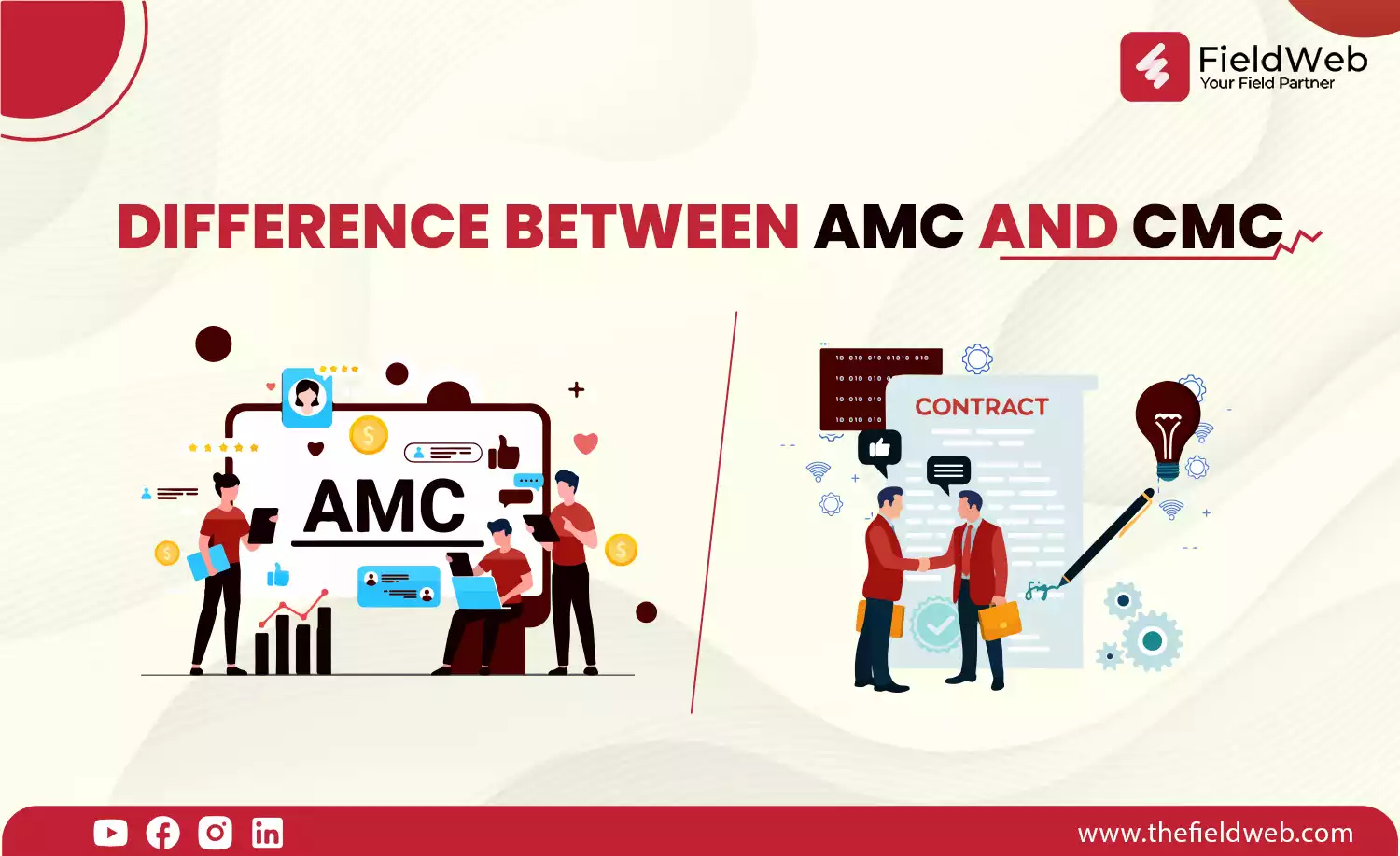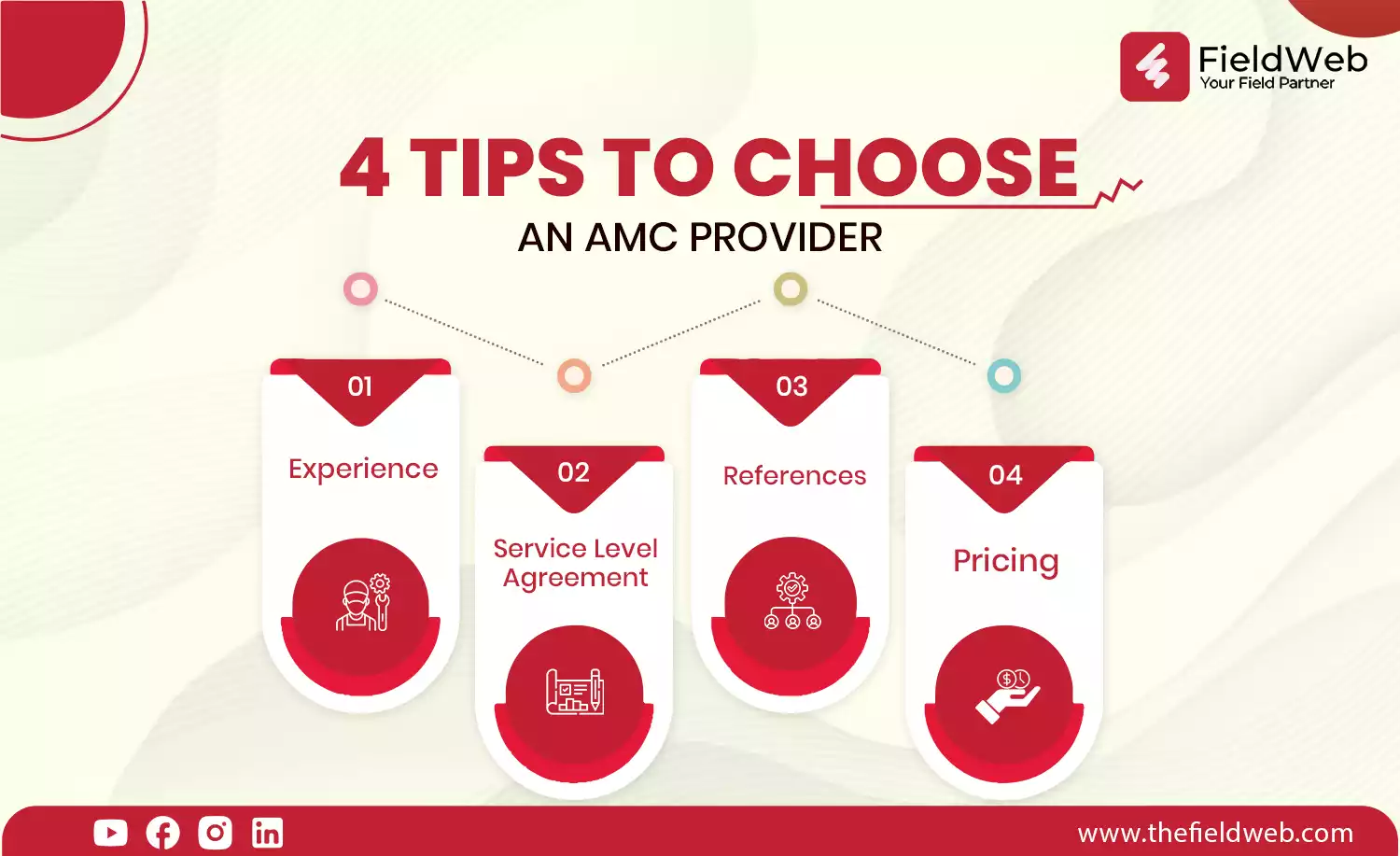FieldWeb Blog.
Get the knowledge and inspiration you need to run your home and commercial service business better.

An AMC is a service agreement between businesses and service providers that provides regular maintenance and repair services for equipment and machinery. AMCs provide numerous advantages, such as cost savings, increased equipment lifespan, routine maintenance checks, and priority service. In this article, we will discuss the various components of an AMC, the differences between AMCs and Comprehensive Maintenance Contracts (CMCs), how to select an AMC provider, and how FieldWeb-FSM can assist service providers with AMC management.
AMCs offer several benefits to businesses that choose to sign up for them, including:

AMCs are a low-cost method of maintaining equipment and machinery. Instead of paying for ad hoc repairs, AMCs allow businesses to spread the cost of maintenance over the life of the contract. AMC for an air conditioning system, for example, could cost $1,000 per year, whereas a single repair could cost $500. Signing up for an AMC allows the company to save money on repairs while also improving their bottom line.
AMC customers typically receive priority service from the service provider in the event of an issue with equipment or machinery. This means that businesses can quickly restore their equipment, minimising downtime and avoiding lost productivity. An AMC for a printing press, for example, may guarantee a response time of 24 hours, whereas non-contract customers may have to wait a week for service.
Regular maintenance checks can help extend the life of equipment and machinery. AMCs ensure that equipment is regularly checked and maintained, identifying and fixing issues before they become more serious problems. For example, an AMC for a generator might include regular oil changes and filter replacements, which can help the generator last longer and perform better.
An AMC must include regular maintenance inspections. Businesses can avoid costly repairs and replacements by routinely maintaining their equipment and machinery. Furthermore, it assists businesses in maintaining optimal equipment condition, lowering the risk of unexpected downtime.An Annual Maintenance Contract for an elevator, for example, might include regular inspections, lubrication, and adjustments to prevent breakdowns and malfunctions.
Businesses can rest assured that their equipment and machinery are in good hands with an AMC. It is the responsibility of service providers to ensure that equipment is well-maintained and operating properly. This approach enables businesses to concentrate on their core operations while knowing that their equipment is well-maintained. An Annual Maintenance Contract (AMC) for a computer network, for example, might include regular backups, virus scans, and software updates, all of which can help prevent data loss and downtime.
AMCs typically include the following components:

1. Scope of Services: The scope of services included in an AMC specifies the specific services that will be provided by the service provider. This includes the equipment covered, the type of maintenance performed, and the frequency with which it is performed. An AMC for a manufacturing plant, for example, could include maintenance for production equipment, HVAC systems, and electrical systems, as well as monthly or quarterly service visits.
2. Contract Duration: The contract duration specifies how long the AMC will be in effect. AMCs are typically for one year, though longer contracts are also available. An AMC for a hospital, for example, could last three years with annual renewal options.
3. Service Frequency: The frequency with which the service provider performs maintenance checks is defined as service frequency. Service frequency varies according to the type of equipment and the level of maintenance required. An AMC for a commercial kitchen, for example, might include weekly or biweekly visits, whereas an AMC for a water treatment plant might include daily visits.
4. Service Level Agreement (SLA): The SLA specifies the service provider's commitments in terms of response time, resolution time, and service level. The SLA is an important aspect of the AMC because it establishes expectations for both parties. For example, an AMC for an IT infrastructure might include a SLA that guarantees a two-hour response time and a four-hour resolution time for critical issues.
5. Cost: The price of an AMC is determined by several factors, including the type of equipment, the scope of services, and the length of the contract. An AMC is typically less expensive than ad hoc repairs, making it a cost-effective option for businesses. AMC for a fleet of vehicles, for example, could cost $100 per vehicle per month, whereas a single repair could cost $500 or more.

Annual Maintenance Contracts (AMCs) are frequently mixed up with Comprehensive Maintenance Contracts (CMCs) (CMCs). While both agreements provide maintenance and repair services, there are some important distinctions. CMCs typically cover more extensive repairs and replacements, whereas AMCs typically cover only routine maintenance and minor repairs. CMCs are typically more expensive than AMCs, owing to the higher level of service provided. An AMC for a photocopier, for example, may include routine maintenance such as cleaning and toner replacement, whereas a CMC may cover major repairs or part replacements.
When choosing an AMC provider, businesses should consider the following factors:


FieldWeb-FSM is a cloud-based Field Service Management (FSM) software that assists service providers in effectively managing their AMCs. Service providers can use FieldWeb-Field Service Management to schedule maintenance visits, track service requests, and manage technicians' schedules. Service providers can use FieldWeb-FSM to optimise their field operations, increase efficiency, and improve customer satisfaction.
Finally, AMCs provide several advantages to businesses, such as cost savings, increased equipment lifespan, regular maintenance checks, priority service, and peace of mind. Businesses should consider the AMC provider's experience, SLA, references, and pricing when selecting an AMC provider.
AMCs are distinct from CMCs, which offer more comprehensive maintenance and repair services. FieldWeb-FSM is cloud-based Field Service Management software that assists service providers in effectively managing their AMCs and CMCs, increasing efficiency and improving customer satisfaction. Businesses can ensure that their equipment and machinery are well-maintained by selecting the right AMC provider and using Field Service Management (FSM) software, minimising downtime and maximising productivity.